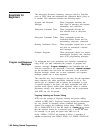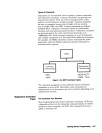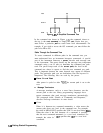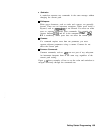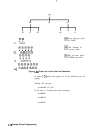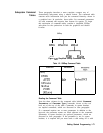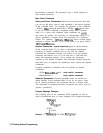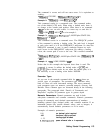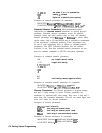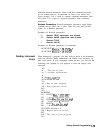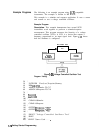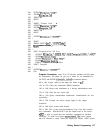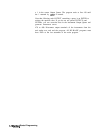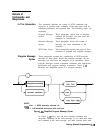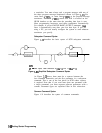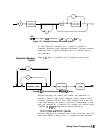
-7.89E-01
use either E or e in exponentials
+256
leading
+
allowed
.5
digits left of decimal point optional
Examples of numeric parameters in commands:
100 OUTPUT
@Source
;
”
:
FREquency :
STARt
l.OE+09”
1 IO OUTPUT @Source
;
I’
:
LIST:FREquency
lO.Oe+9,le+7”
Extended Numeric Parameters. Most measurement related
subsystems use extended numeric parameters to specify physical
quantities. Extended numeric parameters accept all numeric
parameter values and other special values as well. All extended
numeric parameters accept
MAXimum
and
MINimum
as values. Other
special values, such as UP and DOWN may be available as documented
in the instrument’s command summary. Some instruments also
let you to send engineering units as suffixes to extended numeric
parameters. The SCPI Command Summary lists the suffixes
available, if any. Note that extended numeric parameters are not
used for common commands or STATUS subsystem commands.
Examples of extended numeric parameters:
100. any simple numeric values
-1.23 largest valid setting
4.56e<space>3
-7.89E-01
+256
.5
MAX
MIN
valid setting nearest negative infinity
Examples of extended numeric parameters in commands:
100 OUTPUT
OSource;“:FREQuency:STOP
MAX”
110 OUTPUT @Source
;
”
:LIST:FRELjuency
MAX,MIN”
Discrete Parameters. Use discrete parameters to program settings
that have a finite number of values. Discrete parameters use
mnemonics to represent each valid setting. They have a long and a
short form, like command mnemonics. You can use mixed upper and
lower case letters for discrete parameters.
Examples of discrete parameters:
INTernal
level internally
DIODe
level using an external diode
PMETer
level using an external power meter
MMHead
Level using a mm-wave source module
Examples of discrete parameters in commands:
100 OUTPUT @Source;
”
:POWer:ALC:SOURce
INT”
110 OUTPUT @Source
;
”
:POWer:ALC:SOURce
mmh”
1-74 Getting Started Programming



